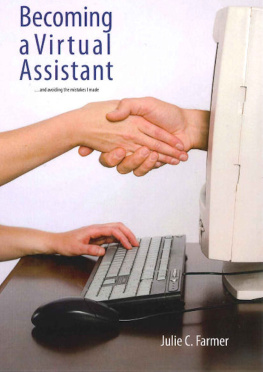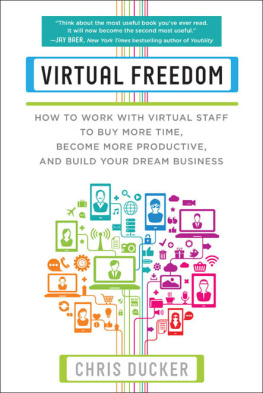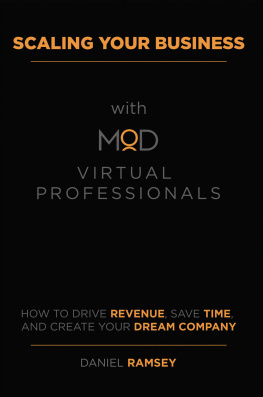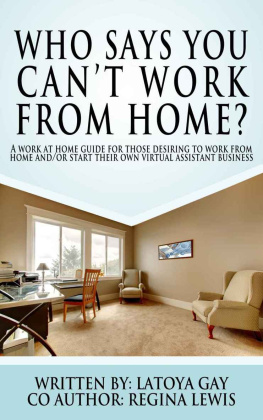Becoming a Virtual Assistant
And avoiding the mistakes I made
By
Julie Farmer
Published in 2011 by Julie Farmer Publishing. Copyright Julie Farmer
All rights reserved. No part of this publication may be reproduced, sorted in any retrieval system or transmitted in any form or by any means, electronic, mechanical, photocopying, recording or otherwise without the prior written permission of the copyright holder for which applications should be addressed in the first instance to the publishers. No liability shall be attached to the author, the copyright holder or publisher for loss or damage of any nature suffered as a result of reliance on the reproduction of any of the contents of this publication or any errors or omissions in its contents.
Designed by Brian Smithson, electronicdawn Limited. www.edaw.biz
Printed in the UK by Dartnell UK Ltd. brm@dartnell.co.uk
Julie Farmer Publishing
Brunel House, Volunteer Way,
Faringdon,
Oxfordshire, SN7 7YR
Tel: 0845 859 1720
www.juliefarmer.co.uk
Sections
A Little about the history of a Virtual Assistant and
What service you could offer as a Virtual Assistant
Setting up your business and what you need to consider
and plans you need to put into practice
The practical aspects of setting up a Virtual
Assistant business and running your business
All about the finance within your business
Conclusion
Introduction
 My name is Julie Farmer and in 2002, I set up my own Virtual Assistant company in Oxfordshire, United Kingdom. Having started on my own, I now employ a number of people who work with me, and we cover a range of administrative and secretarial services for a wide variety of clients.
My name is Julie Farmer and in 2002, I set up my own Virtual Assistant company in Oxfordshire, United Kingdom. Having started on my own, I now employ a number of people who work with me, and we cover a range of administrative and secretarial services for a wide variety of clients.
We are in a world of technology, and communication is the key to almost every business solution. It is now possible to talk to somebody via your computer who lives half way around the world, send files as email attachments, and even view and work on documents remotely.
The skills and services of a talented Virtual Assistant/PA are in high demand. A Virtual Assistant can work with anybody, anywhere, any time. This is a new way of working and an extremely fulfilling career.
I have written this book to give you an insight into this profession and share with you some of my experiences. My aim is to give you an idea of what it is like to be a Virtual Assistant and tell you what you need to know to start up as a Virtual Assistant yourself this includes helping you to avoid the mistakes I have made.

Julie Farmer
myPA Business Ltd
April 2011
Choosing to be a Virtual Assistant
What is a Virtual Assistant ?
Having run a successful Virtual Assistant business for nearly ten years, I am frequently asked this question. I suppose the term is not familiar to everybody and it can sound like quite a strange concept. The question is usually closely followed by why use a Virtual Assistant? This first chapter explores both the concept of the Virtual Assistant and the reasons why people and businesses choose to employ one.
I would describe a Virtual Assistant (VA) as follows: someone who works for a small business or organisation, but is not directly employed by them, yet who has accountability for the work they do on their behalf. They are, in effect, a subcontractor who provides secretarial and/or administrative support.
The duties of a VA can include scheduling activities such as meetings, organising travel, social media, customer service, email campaigns, book-keeping and much more. A VA can work from their own office (they might, for example, rent office space in a shared building), from their home office, or from the offices of their clients. They can also do a combination of any of these.
The definition of a Virtual Assistant on the Wikipedia website is as follows:
A Virtual Assistant (typically abbreviated to VA, also called a virtual office assistant) is an entrepreneur who provides professional administrative, technical, or creative (social) assistance to clients from a home office. They usually work for other small businesses, brokers and consultancy groups. It is estimated that there are as few as 5,000-8,000 or as many as 25,000 Virtual Assistants worldwide; the profession is growing in centralised economies with "fly-in, fly-out" (FIFO) staffing practices.
www.wikipedia.org
There is currently a debate in the industry about the title of a Virtual Assistant and whether we as an industry should change it. The general feeling is that the title Assistant, to those who arent familiar with the industry, doesnt give an accurate impression of the variety of roles a VA can fulfil .
I believe there are four types of Virtual Assistants:
Virtual Assistant (VA) A VA is someone who has the ability to assist their client with a number of secretarial and administrative tasks, normally on a short-term project basis. Equally, they may undertake individual jobs over a period of time; for example, creating a database from business cards.
Virtual Personal Assistant (VPA) A VPA is someone who works closely with a small business owner, providing secretarial and administrative support, and who is there for the long-term. The relationship could be seen as similar to that of employer and employee, but the VPA will only visit the client once or twice a week and despite the longevity of the relationship, is generally self-employed.
Virtual Executive Assistant (VEA) A VEA is someone who works closely with a small business owner to provide secretarial and administrative support. They also get involved in some of the business development for the company. The VEA is an important part of the business, becoming one of the planners and authorising partners.
Personal Assistan t A PA is someone who generally works for one person in one organisation. However in the VA world , many VAs call themselves PAs as many employers/clients understand this term better.
For the purpose of this book I am going to use the term Virtual Assistant (VA) to include all of the above.
Why would I want be become a VA ?
There are many benefits to becoming a VA. One of the most exciting is that you become an entrepreneur you are your own boss.
Lets take a look at a few of the benefits that come along with that.
Flexibility As a VA, you can decide what hours you work as well as what jobs you want to undertake. If a job sounds interesting, great do it. If not, you can pass and continue looking for something else. Some clients will want you to be available during very specific hours, while others will want you to be more project-based. As long as you complete the project in line with the agreed specification and deadline, you can work whatever hours you want. This provides an invaluable opportunity for working around the other demands of your life such as parenting or time-consuming hobbies. A word of caution: there is flexibility in being a VA but it has to work both ways. Your clients will often have tight deadlines to meet and adhere to. On occasion, you may have to fall in line and change your own plans in order to help your clients meet their deadlines.
Diversity As a VA, you can work for clients in your own town, your own county, or even around the world. You can have the diversity of working for one client, answering emails and scheduling speaking engagements and an hour later making sales calls for a mini bus hire company. It certainly keeps things fresh and interesting. If you find are not enjoying a job, you have the opportunity for change with the next work you take on.
Next page










 My name is Julie Farmer and in 2002, I set up my own Virtual Assistant company in Oxfordshire, United Kingdom. Having started on my own, I now employ a number of people who work with me, and we cover a range of administrative and secretarial services for a wide variety of clients.
My name is Julie Farmer and in 2002, I set up my own Virtual Assistant company in Oxfordshire, United Kingdom. Having started on my own, I now employ a number of people who work with me, and we cover a range of administrative and secretarial services for a wide variety of clients.